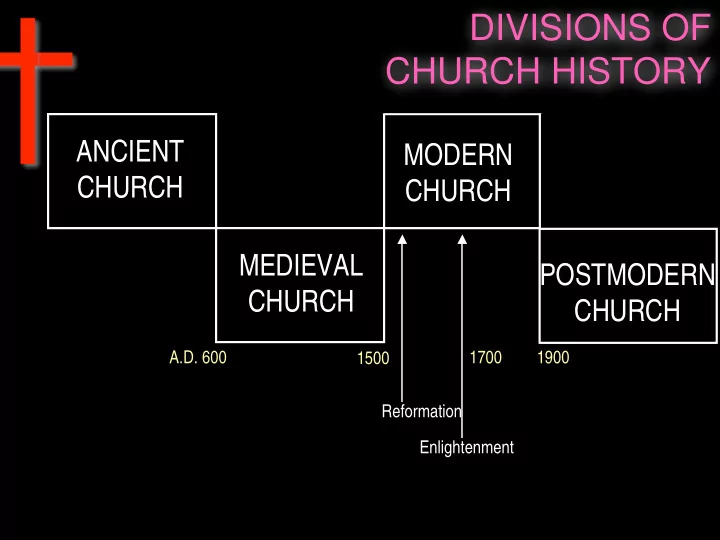

DIVISIONS OF CHURCH HISTORY ANCIENT MODERN CHURCH CHURCH MEDIEVAL POSTMODERN CHURCH CHURCH A.D. 600 1500 1700 1900 Reformation Enlightenment
Key Ideas on Atonement in the Early Church 1. Penal: a penalty paid either to Satan as ransom, or in relation to divine justice. 2. Substitution: Jesus dies in the place of sinners, the Just for the unjust, the Righteous for the unrighteous. Especially, Diognetus . 3. The work is directed to the Father. 4. Tertullian introduces the concept of satisfaction. 5. Irenaeus: Recapitulation; penal and substitutionary.
Scotus’ “Horrible” Understanding of the Atonement 1. Scotus’ ideas are influential through Socinus, Grotius, and Finney. 2. Minimizes the righteousness and justice of God and the sinfulness of sin. 3. Christ’s death was of only finite value, John Duns Scotus and thus could not pay a debt or 1266–1308 vindicate justice. 4. The Atonement is unnecessary but is a sign of of God’s pleasure in Christ’s work.
1. Distorts God’s attributes by Faustus Socinus subordinating God’s justice and mercy to His will. 2. Sin thus is not a violation of God’s righteousness, but His will (which may or may not demand punishment) 3. For Him God has no intrinsic necessity to punish sin. He can forgive it if He wills, or not regardless of punishment. Faustus Socinus 4. Puts the emphasis on human works: (1539–1604) repentance. 5. Christ’s death is not a penal substitutionary death, but to inspire us and to motivate us to obey Him. (Abelardian)
The Grotian or Governmental View of the Atonement 1. Leading Jurist and Arminian of his time. Hugo Grotius (1583–1645) 2. Diminishes the character of God. 3. Unnecessary, but demonstrates God’s rejection of sin. 4. Based on his view of divine government: the effect of His will. (Not His will, but only His chosen action, thus He does not necessarily need to punish sin.
Recommend
More recommend